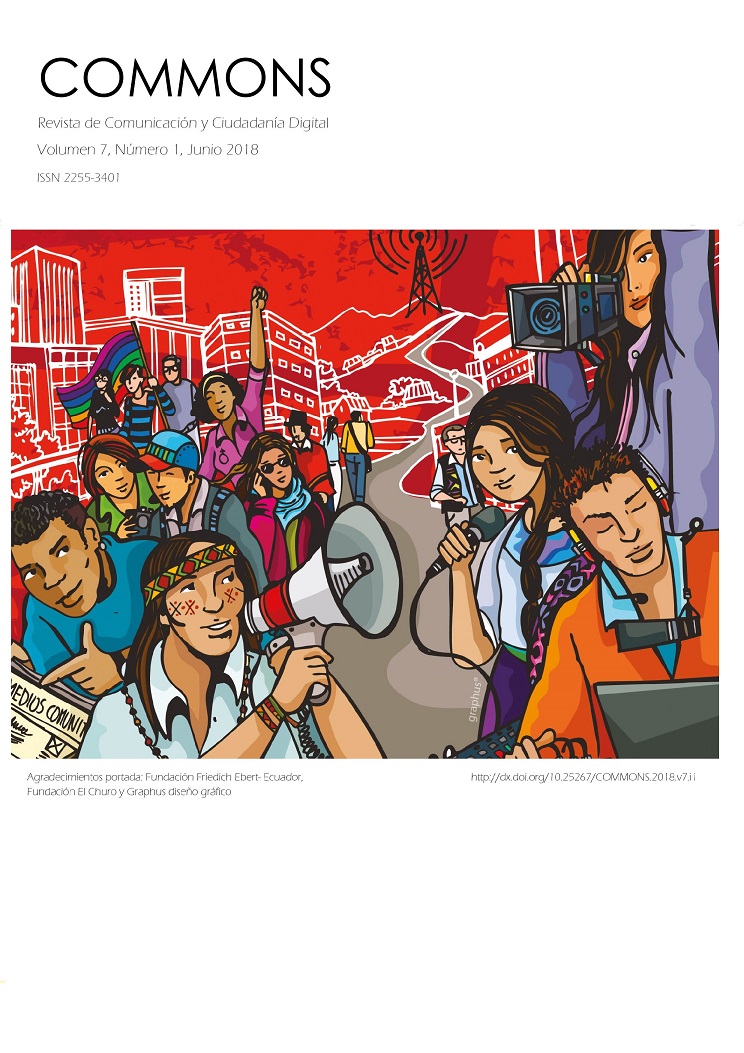La televisión cooperativa y comunitaria en la Argentina frente al imperativo de la convergencia digital / Cooperative and Community Television in Argentina in the Face of the Imperative of Digital Convergence

Additional Files
Info
Abstract
The info-communicational convergence is usually analyzed focusing on the big players, which by volume and capital have more capacity for development in the market. In this sense the concept is linked to the growing processes of centralization of capital and concentration of property. This problematic nucleus, which is exclusive to think about the processes of introducing innovations, is nevertheless insufficient to reflect on the peripheries of the system. This is the case of the info-communicational actors of the Social and Solidarity Economy that occupy a place that we define from the category “peripheral convergence”. From a perspective that articulates the Right to Communication and the Economy of Communications, we analyze the transformations of the sector as an industry and its emergence and consolidation as an info-communicational asimetric actor. Using the case analysis, we present cooperative and community audiovisual experiences of wide diversity and located in different regions of the country.
Keywords
Downloads
How to Cite
License
Authors who have published with this journal accept the following terms:
- Authors shall retain their copyright and guarantee the journal the right of first publication of their work, which shall simultaneously be subject to the Creative Commons 3.0 Recognition License, which allows third parties to share the work as long as its author and first publication are indicated in this journal.
- Authors may adopt other non-exclusive licensing agreements for the distribution of the published version of the work (e.g., depositing it in an institutional telematic archive or publishing it in a monographic volume) provided that the initial publication in this journal is indicated.
- Authors are permitted and encouraged to disseminate their work via the Internet (e.g., in institutional telematic archives or on their website) before and during the submission process, which may lead to interesting exchanges and increased citations of the published work. (See The Effect of Open Access).
References
AMIN, S. (2001). Capitalismo, imperialismo, mundialización. En SEOANE, J. & TADDEI, E. (Comps.), Resistencias Mundiales [De Seattle a Porto Alegre] (pp. 13-27). Buenos Aires: CLACSO.
ARROYO, L. & BECERRA, M. et al. (2012). Cajas mágicas. El renacimiento de la televisión pública en América Latina . Madrid: Editorial Tecnos.
BECERRA, M. & MASTRINI, G. (2009). Los dueños de la palabra: acceso, estructura y concentración de los medios en la América Latina del siglo XXI. Buenos Aires: Prometeo.
BECERRA, M. (2010). Mutaciones en la superficie y cambios estructurales. América Latina en el Parnaso informacional. En MORAES, D. (Comp.), Mutaciones de lo visible. Comunicación y procesos culturales en la era digital (pp. 81-112). Buenos Aires: Paidós.
BECERRA, M. (2015). De la concentración a la convergencia. Políticas de medios en Argentina y América Latina . Buenos Aires: Paidós.
BECERRA, M. (2016a, 26 de octubre). Asimetrías de la Convergencia . [blog]. Recuperado de: https://goo.gl/gJJokJ
BECERRA, M. (2016b, 17 de mayo). La convergencia es más que un proyecto de ley. [blog]. Recuperado de: https://goo.gl/zxmLRo
BECERRA, M. (2017, 2 de enero). A falta de inversiones llueven decretos [blog]. Recuperado de: https://goo.gl/Naj5F9 BECERRA, M. & MASTRINI, G. (2009). “Panorama de las políticas infocomunicacionales en la Argentina de 2008”. En Cuadernos de políticas culturales: Indicadores culturales 2008 . (pp. 160-169). Caseros: Eduntref
BECERRA, M., & MASTRINI, G. (2017). La concentración infocomunicacional en América Latina (2000-2015) Nuevos medios y tecnologías, menos actores. Bernal: Universidad Nacional de Quilmes; Observacom.
BIZBERGE, A. (2017). Los desafíos de la convergencia digital para las políticas de comunicación. En LABATE, C. & ARRUETA, C. (Comps.), La Comunicación Digital. Redes sociales, nuevas audiencias y convergencia: desafíos y oportunidades para la industria, el Estado y los usuarios (pp. 19-38). San Salvador de Jujuy: Editorial de la Universidad Nacional de Jujuy-EDIUNJU.
BUSTAMANTE, E. (Coord.) (2003). Hacia un nuevo sistema mundial de comunicación . España: Gedisa.
COLSECOR (2016). COLSECOR frente al debate por una regulación de las Comunicaciones Convergentes [Documento]. Recuperado de: www.colsecor. com.ar/colsecor/COLSECOR%20Aportes%20LeyCom.pdf
CORAGGIO, J., LAVILLE, J. & CATTANI, A. (Orgs.) (2013). Diccionario de la otra economía . Argentina: Universidad Nacional de General Sarmiento.
DEFOURNY, J. (2013). Economía social. CORAGGIO, J., LAVILLE, J. & CATTANI, A. (Orgs.), Diccionario de la otra economía . Argentina: Universidad Nacional de General Sarmiento. LAVILLE, J-L. & GAIGER, I. (2013). Economía Solidaria. CORAGGIO, J., LAVILLE, J. & CATTANI, A. (Orgs.), Diccionario de la otra economía. Argentina: Universidad Nacional de General Sarmiento.
MONJE D., RIVERO, E., et al . (2017). Otro territorio. Impacto de la convergencia periférica en el sector audiovisual de la Economía Social y Solidaria en Argentina. En CABRAL, A., BOLAÑOS, C., ARAUJO, D., ANDACHT, F. & PAULINO F. (Eds.), Nuevos Conceptos y Territorios en América Latina (pp. 199-229). Brasil: ALAIC. Recuperado de: https://goo.gl/r9s69Z
RABOY, M. (2002). Television and deregulated global markets. En RABOY, M. (Ed.), Global Media Policy in the New Milennium, (pp. 21-24). América Latina y Ecuador: Ediciones CIESPAL, ISBN:978-9978-55-156-1.
SCOLARI, C. (2009). Alrededor de la (s) convergencia (s). Revista Signo y Pensamiento, XXVIII enero-junio(54), 44-55.
SEGURA, M. S. & WAISBORD, S. (2016). Media Movements. Civil Society and media policy reform in Latin America . Londres: Zed Books.
SEGURA, M.S. & WECKESSER, C. (2016). Los medios sin fines de lucro entre la ley audiovisual y los decretos. Estrategias, desafíos y debates en el escenario 2009 2015 . Córdoba: Edit. UNC.
VAN AUDENHOVE, L. et al . (1999). Information Society policy in the developing World: a critical assessment. Third World Quarterly, 20 (2), 387-404.
VAN CUILEMBURG, J. & MCQUAIL, D. (2003). Paradigm Media Policy Paradigm Shifts: towards a new communications policy. European Journal of Communication, 18 (2), 181-207.


